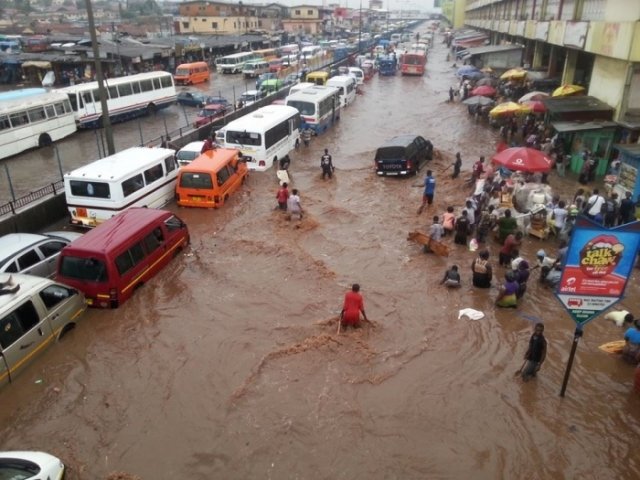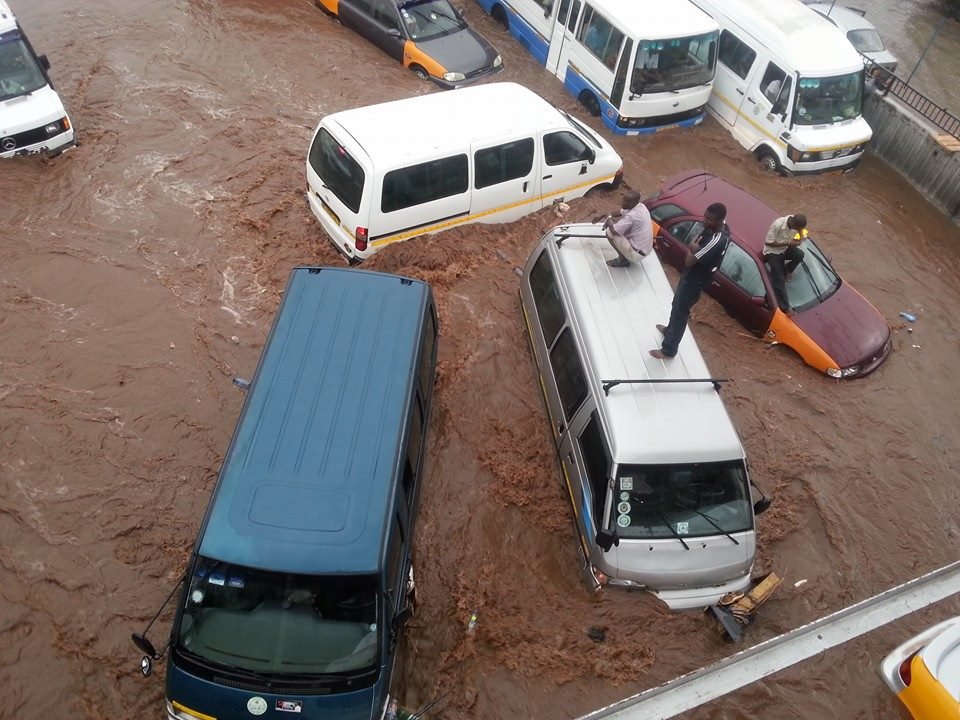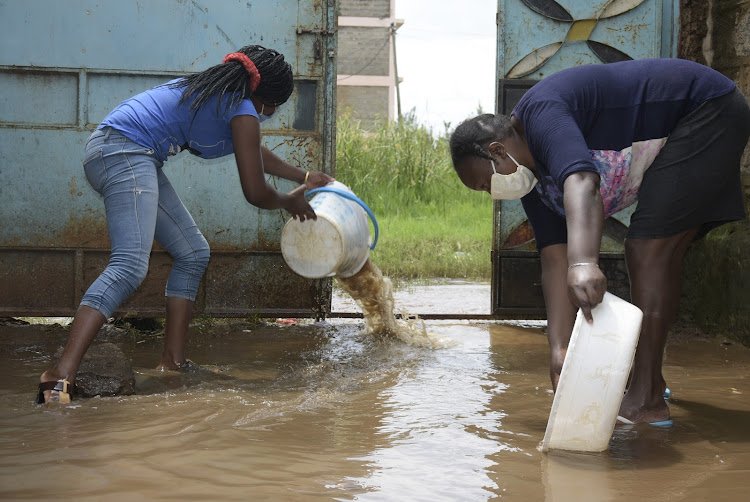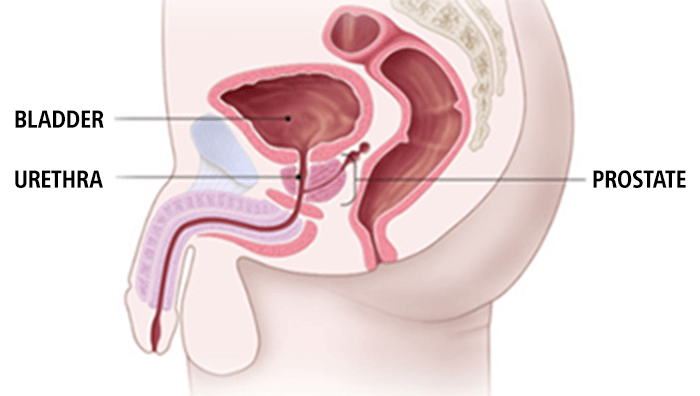Health Essentials
Dancing with the rain

“Once AGAIN, torrential rains have hit the Accra Metropolis, creating heavy floods in various parts that have caused great havoc to lives and property. The team of ministers, the Mayor of Accra, officials of the National Disaster Management Organisation (NADMO) and the security agencies are going round to ascertain the impact” –GNA, 2009

I have highlighted “ONCE AGAIN” for obvious reasons. The scenario above is almost a ritual. As soon as the sun shines consistently, and the land dries up, you can be sure that we will lay down our pens, take off our boots, jump into our budget crippling SUVs, return to discussing “more pressing issues” and pretend it was all just a dream. How many more warnings do we need as a nation before we sit up? Maybe 70 X 7! If God was human he definitely would have been fed up with us by now and that will mean we would have been left to our fate. We are all to blame. NO EXCEPTIONS!
Even die-hard optimists are beginning to show signs of fatigue. I haven’t written about floods in Accra in a while now and I was inspired to reproduce this after reading Emmanuel J. K. Arthur’s Accra is “celebrating” its Annual Flooding Festival and I quote him “traditionally the Festival is celebrated by Accra residents who live in low-lying areas, also known as Flood Prone Areas. It is “celebrated” from March and climaxed in June every year since 1960s. During the period, the sitting Works and Housing Minister and the Regional Minister are joined by District and Municipal Assembly Heads to tour “celebrating areas” to reiterate the commitment of Government to end the perennial flooding…………This year’s “celebration” is on the theme Blaming all for our collective actions.” What else can I add to this masterpiece? We seem to enjoy this and have no plan to “dig” ourselves out of this hole. Maybe we should get rid of a number of our army of ministers and appoint a Flood Prevention Minister.
I hate to have to do this again but once started at least let us remind ourselves of some of the challenges floods cause to our fragile economy.
CAUSES OF FLOODS
- Urbanisation
- Migration of people from the rural areas to the large cities such as Accra and Kumasi has led to an explosion in their population. We have outstripped the already poorly planned facilities available
- The urban poor in the capital of Accra are especially (but everyone feels the pinch) vulnerable to the effects of flooding due to poorly and often illegally built structures, (many across the paths of water bodies) overcrowded living conditions, and inadequate sewage and drainage systems that are often clogged with refuse. Scarcity of land has also forced many people to occupy low lying areas and are prone to floods
- Decreased Capacity of Drainage Channels
- our drains are choked with refuse or are silted up as are our rivers and streams
- Incapacity of Drains and Culverts
- Drains are absent in many places, unfortunately in privileged areas where we may find some semblance of drains, their capacity is woefully inadequate. In some areas open gutters compete for honours as to which of them is able to reclaim the sand/silt skillfully dug out and lined on their edges. Really do we expect nature to find a way of leaving them along the edges of the drains till the rapture? How ridiculously NEGLIGENT can we be as a people. Is someone being paid to take care of these? They had better come out clearly to say they are and have been on STRIKE since they were appointed instead of claiming to be at work and doing absolutely nothing.
- Impact of Climate Change
- Extreme changes in weather are here to stay, so we had better find practical solutions to keep us safe. The rains are erratic, the sea levels are rising above many inhabited land and it’s only a matter of time.
- Human Attitude
- Probably the most important. All the factors listed above are directly linked to our activities. Drains serve as our garbage disposal areas, edges of gutters are ideal for leaving heaps of sand and deforestation and exhaust fumes are adversely impacting our climate. We sow INDISCIPLINE and one of the many things we reap is flooding.
EFFECT OF FLOODING
- Economic Loss
- Destruction of property can be extreme and in many situations it can bring economic activity to its knees. People are busy taking care of their homes, factories are shut because of the havoc caused by the water and several hours to days, weeks, months and even years of economic activity are lost
- Resources that could have been used to develop the country will now be used for reconstruction – what an absolute waste!
- Environmental
- Our already ridiculous traffic situation will graduate to another level totally unheard of. This is caused by damaged roads (if the roads even exist), destroyed bridges and workmen trying hard to intervene.
- Damaged farmlands will bring about economic hardships for our farmers as stored food and farm produce may be destroyed. Certainly these losses will eventually hit the pockets of even those who live many miles away. Can you imagine the strain on our already over-burdened pockets?
- Humans
- Once again, I will separate the number one culprit. Lives are lost (including through drowning) as well as homes, businesses, vehicles and many more
- Diseases
- Floods will always leave a myriad of diseases in its trail, both immediate and long term. Infectious diseases will have a field day and these include; common cold, food poisoning (especially when there is no electric power), cholera, typhoid and hepatitis A. Remember when everything settles, malaria will rear its ugly head.
- The physical and mental impact on our health is often ignored but anyone who has been a victim of the effects of a flood will tell you that they experience; shock, anxiety, fear, sadness, anger and physical symptoms such as headaches and general body pains. It sounds to me as Post Traumatic Stress Disorder, what about you? Your guess is as good as mine; the effects are most devastating in children.
LOOK OUT FOR THESE AFTER A FLOOD
After a flood, it’s time to clean up and put the pieces back together. Life will go on and those paid to address such situations will go back to sleep.
For those of us who have to do the “dirty” work, take note of the following:
- Electrocution – put off power sources.
- Broken bottles, nails and other sharp objects that may injure you.
- Avoid contact with insects and animals (there may be many stray animals with diseases such as rabies)
- Wash your hands thoroughly with soap and water as often as needed and wear protective gloves and other clothing, if possible
- Get rid of all the mud and use disinfectants
STEPS TO AVOID FUTURE FLOODS
I won’t even venture into this terrain again. Let us all FIX our ATTITUDES. That is all it takes; DO THE RIGHT THING wherever you find yourself and maybe just maybe we will be able to look back one day and say Accra would have been flooded by now.
I hope that in my lifetime, I will not have to write again “so long a letter” because we will be on top of our flood avoidance and preparedness programme.
AS ALWAYS LAUGH OFTEN, ENSURE HYGIENE, WALK AND PRAY EVERYDAY AND REMEMBER IT’S A PRICELESS GIFT TO KNOW YOUR NUMBERS (blood sugar, blood pressure, blood cholesterol, BMI)
Dr. Kojo Cobba Essel
Health Essentials Ltd/ Mobissel
(www.healthessentialsgh.com)
*Dr. Essel is a medical doctor, holds an MBA and is ISSA certified in exercise therapy, fitness nutrition and corrective exercise.
Thought for the week – “It does not need one with a high IQ to “guess” that building in the wrong places, building without drains, throwing rubbish in gutters, not having a plan to desilt water bodies or clean out drains will eventually lead to flooding’
References:
- The Holy Bible – Mathew 18:21
2“Impact of floods in Ghana and the way out” – Bentil Asafo-Duho
3. Journal of Water and Health -2009
4. WHO – Flooding and Communicable Diseases
5. Centers for Disease Control and Prevention (USA)
6. Accra is ‘celebrating’ its Annual Flooding Festival – Emmanuel J.K. Arthur
By Dr. Kojo Cobba Essel
Health Essentials
Show Me Your Friends and I Will Show You Your Health Span
“Me nyare n’anso me nti ap)” is a popular Akan saying that can be translated into English as “I am not ill, yet I feel unwell.” It is that feeling when you just can’t place a finger on what is not right with you.
Today, I can confidently inform you that if you have felt this way in the past, you certainly had a point. Medical science has come a long way, and we know that health and wellness go far beyond the physical aspects such as pain, heart disease, or infections.
Other equally important aspects of wellness exist, and these may be classified as Social, Mental, Spiritual, Financial, and Digital Health and Wellness.
Do not be surprised when your doctor begins to ask you questions about your social network, such as those you have close ties with—family, friends, or both. Longevity depends to a large extent on one’s social support system or network.
As the American Heart Association notes, “lack of SOCIAL CONNECTION is associated with increased risk of premature death from all causes, especially among men.”
This is no open ticket to spend all of one’s after-work hours hanging out with friends under the disguise that you are prolonging your life. Moderation is key in all things, and your strong social ties need not be a whole village. All you need is a handful of loyal friends or family who know you inside out and have your wellbeing at heart.
If you are stressed out or have any mental health challenges, you should be able to speak to a close friend. Sharing your challenge may just be enough, or this friend may be able to advise you appropriately. It is easy to laugh with such friends and not be worried about being judged. Laughter, as you know, is medicine.
Close contacts may prompt you to take your physical health seriously, but even if they don’t, that bond you share produces feel-good hormones that protect you and prolong your health span.
I prefer health span to lifespan simply because lifespan refers to just being alive, but one may not be “living”—you could be bedridden, in a coma, or have multiple organ challenges. We should all aim for a long health span.
The art of building strong social connections is one reason we need to work on getting our children away from their phones and other gadgets that deprive them of the opportunity to talk to peers, share physical contact, and form lifelong relationships.
Dear friend, choose your friends wisely if you want to live a long, healthy, and happy life.
While you work on your social connections, let us breathe our way to great health by following the steps below. Repeat these steps daily:
- Sit in a quiet place.
- Avoid tight clothing (loosen your belt, necktie, or other constricting clothing).
- Take deep breaths through your nostril and exhale slowly through partially closed lips.
- At the peak of your initial inhale, take in another breath and hold for a count of 4 before exhaling.
- Expand your belly as you breathe in.
- Focus on your breathing and forget about everything else.
- When your focus drifts off (and it will about 50% of the time), acknowledge the thought but quickly return to your breathing.
- Continue breathing in and exhaling for five minutes.
- Increase the duration of this breathing/mindfulness over time.
…and remember to teach your friends to breathe too. After all, together you will live a long, healthy, and enjoyable life.
As always: laugh often, ensure hygiene, walk and pray every day, and remember it’s a priceless gift to know your numbers (blood sugar, blood pressure, blood cholesterol, BMI).
Dr. Kojo Cobba Essel
Health Essentials Ltd (HE&W Group)
(dressel@healthessentialsgh.com)
Dr. Essel is a Medical Doctor with a keen interest in Lifestyle Medicine. He holds an MBA and is an ISSA Specialist in Exercise Therapy, Fitness Nutrition, and Corrective Exercise. He is the author of the award-winning book, Unravelling The Essentials of Health & Wealth.
Thought for the week (1): “Lack of sleep may predispose you to many diseases including a STROKE. Jump into bed an hour earlier and sleep a stroke away.”
Thought for the week (2): “There is no magic formula to being happy, but making a conscious effort to be happy goes a long way.”
Join us at the La Palm Royal Beach Hotel for our end-of-year Wellness Festival on Saturday, 29th November 2025, from 6 a.m. to 10 a.m. You should not miss this event. All six pillars of wellness will be at play.
By Dr. Kojo Cobba Essel
Join our WhatsApp Channel now!
https://whatsapp.com/channel/0029VbBElzjInlqHhl1aTU27
Health Essentials
The Prostate Has Found Its Voice

The prostate gland, a small but essential organ found only in men, plays a key role in reproductive health. It produces fluid that nourishes, protects, and transports sperm, yet many focus only on its connection to prostate cancer.
Location & Function
- Situated between the bladder and penis, with the rectum behind it.
- The urethra passes through the prostate, carrying urine and semen.
Common Prostate Conditions
1. Prostatitis – Infection of the prostate:
- Symptoms: chills, fever, pus-like urethral discharge, painful urination, groin/testicular pain, painful orgasms, erectile dysfunction.
- Advice: Seek professional help; do not self-medicate.
2. Benign Prostatic Hyperplasia (BPH) – Non-cancerous enlargement of the prostate:
- Symptoms: frequent urination (especially at night), urge incontinence, difficulty starting urination, weak stream, painful urination, blood in urine, terminal dribbling, and in severe cases, inability to urinate.
- BPH can be extremely painful, sometimes compared to labor pains.
3. Prostate Cancer – Common among men, especially black men, often aggressive and with earlier onset:
- Risk Factors: older age, African descent, family history, obesity.
- Symptoms: frequent urination, straining, blood in urine/semen, weak urine flow, new erectile dysfunction; advanced stages may include fatigue, weight loss, and bone pain.
Diagnosis
- Digital rectal examination – checks for irregular or hard areas.
- PSA test, biopsy, ultrasound, CT/MRI/PET scans, bone scan.
Management
- Holistic approaches include watchful waiting, medication, surgery, and radiation (external & brachytherapy).
- Always discuss all options with your healthcare provider.
Risk Reduction Tips
- Regular screening
- Healthy, varied diet rich in fruits and vegetables (carrots, tomatoes, broccoli, kale, cauliflower)
- Maintain a healthy weight
- Exercise at least 5 days a week
Final Advice
- Share this information – the prostate needs support!
- Maintain good hygiene, walk and exercise daily, pray, and know your numbers (blood sugar, blood pressure, cholesterol, BMI).
Thought for the Week:
“There is no magic formula to being happy but making a conscious effort to be happy goes a long way.” – Dr. Kojo Cobba Essel
Dr. Essel invites readers to the La Palm Royal Beach Hotel Wellness Festival on Saturday, November 29, 2025, at 6 a.m., to walk, exercise, network, and share ideas to stay healthy.
Contact: dressel@healthessentialsgh.com
By Dr. Kojo Cobba Essel
Join our WhatsApp Channel now!
https://whatsapp.com/channel/0029VbBElzjInlqHhl1aTU27






